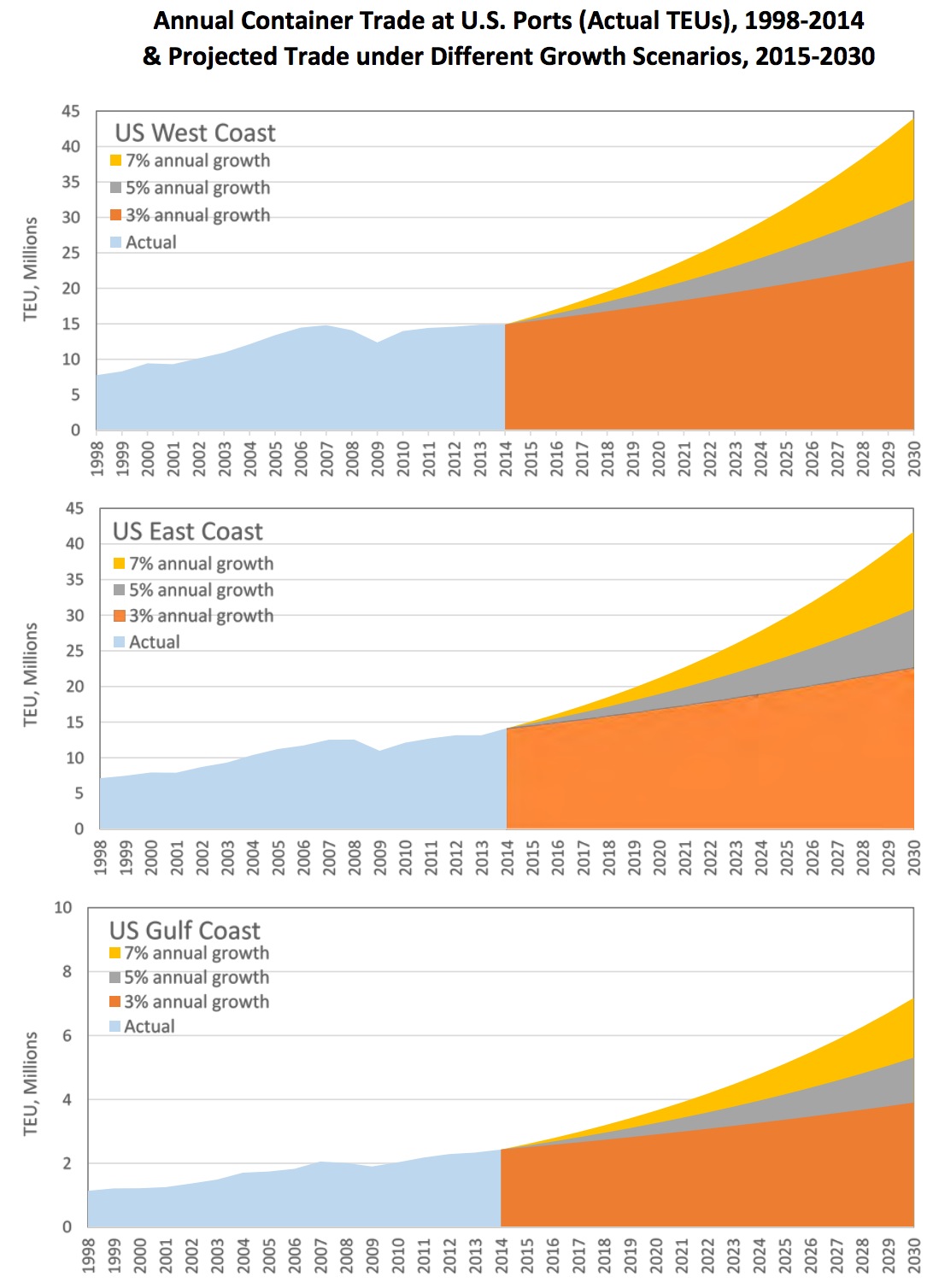FEDERAL MARITIME COMMISSION
Introduction
Global Trade and the U.S. Economy
Global trade is of increasing relevance to the U.S. economy. With the Trans-Pacific Partnership (TPP) and the Transatlantic Trade and Investment Partnership (TTIP) free trade agreements in advanced negotiation, it seems certain that the U.S. role in global trade will expand in the years to come and international trade will become even more engrained in the U.S. economy. According to the World Trade Organization (WTO), the dollar value of world merchandise trade was almost $19 trillion in 2014, $4 trillion of which (over 21%) was accounted for by the U.S. Moreover, the OECD projects that trade-related international freight will expand by a factor of 4.3 by 2050. While international trade through U.S. ports now accounts for around 32 percent of the nation’s economic output (GDP), this figure is expected to reach 60 percent by 2030.
International trade helps to support U.S. jobs. In 2010, the latest year for which full data is available, nearly one quarter of all U.S. manufacturing and agricultural jobs were supported by exports. In today’s modern economy, over half of U.S. traded goods are comprised of intermediate inputs. Importantly, imports of intermediate goods are more sensitive to trade costs (including congestion costs) than are finished products. Because international trade and GDP are thoroughly linked, modern efficient ports are essential in facilitating international trade and in maintaining a healthy and vibrant economy.
Given that future expansion of international trade is inevitable, future demands on the U.S. intermodal system will be considerable. However, compared with the nation’s dry bulk and liquid tanker trades, the nation’s merchandise trade is concentrated at a relatively small number of container ports (see the table below).
The top three U.S. container ports in 2014 accounted for almost 50 percent of the nation’s containerized international trade and the top eleven container ports accounted for over 85 percent. About one-quarter by value of the trade in goods through U.S. seaports via vessels flows through the two main West Coast container ports. On the one hand, this concentration could help America focus resources on expanding the capacity of its most important container ports, but on the other it also makes the freight system more vulnerable to the sort of disruption and delays the industry experienced in the past year or so.
Improved ocean shipping contributes to more efficient international supply chains. As the shipping system becomes more efficient, shipping costs relative to the value of finished products should fall. More efficient supply chains increase not only the volume of trade by lowering the cost of imported and exported goods but it also increases the distances over which those goods can be sourced or sold. In many ways, the elimination of congestion is today’s most critical and relevant trade-related issue. Improving the efficiency of the U.S. international supply chain goes hand in hand with the global effort to facilitate trade. Just last year, the member nations of the WTO recognized the crucial linkages between economic competitiveness, trade facilitation, and global supply chains when they agreed to a new multilateral trade facilitation agreement. Transportation costs are now a larger factor in international trade than are developed-country tariffs on non-agricultural goods. The lack of efficiency in supply chains, logistics and trade facilitation is equivalent to an additional tariff on the imported or exported goods. The U.S. has ample opportunity to improve its supply chain efficiency. The Logistics Performance Index (LPI) published episodically by The World Bank uses scores on six key dimensions to show each country’s comparative performance in logistics. Overall, the U.S. ranks 9th behind countries like Germany, Netherlands, Belgium, U.K., Singapore, Sweden, Norway and Luxembourg.
About the Federal Maritime Commission
www.fmc.gov
The Federal Maritime Commission (FMC) is the independent federal agency responsible for regulating the U.S. international ocean transportation system for the benefit of U.S. exporters, importers, and the U.S. consumer.
Tags: Federal Maritime Commission, FMC, Ports







 RSS Feed
RSS Feed